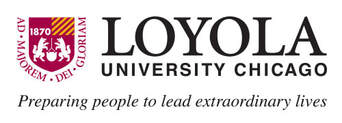 Earlier this week, I saw a post in my ACCEPT Facebook group addressing a letter from Marcus Mason, a former admissions officer at Loyola University Chicago. Mason addressed, in-depth, the consistent pattern of racism, discrimination, and intimidation he experienced in the Undergraduate Admissions Office, specifically from Dean of Undergraduate Admission, Erin Moriarty. This hostile workplace led him to resign his position two weeks ago, as, he points out, have several of his Black and Brown colleagues during Moriarty’s tenure. Mason specifically details a comment that Moriarty made about the Dean of the School of Education, describing him as “[B]lack, [B]lack. Like you almost can’t see him Black.” He also reports that Moriarty has repeatedly said that “she thinks it’s ‘healthy’ for one’s staff to be fearful of their boss.” And when Mason tried to address the issues he saw with Moriarty directly, with Human Resources, and with Vice President of Enrollment Management, Paul Roberts, he was met with disinterest and apathy. As an alumna of Loyola, I feel I have a responsibility to comment on this situation and express my deep disappointment in my alma mater and its leadership team. Loyola University Chicago is a Jesuit institution, one of 28 Jesuit colleges and universities in the US. For those of you who are unfamiliar with the Jesuits, this order specifically prides itself on its social justice work on behalf of low-income and marginalized peoples. Many Jesuit colleges and high schools work to educate their students to become “men and women for others” and “servant leaders.” And LUC specifically calls itself a “college with a conscience. Ethical leaders serving our communities both locally and globally.” But the treatment that Mason describes in his letter is not just, conscientious, or ethical. It’s wrong, and it needs to change. I want to believe that Loyola can change. My experience as a student there was eye-opening. In my sophomore year, I took a service-learning course on nationalism, capitalism, and feminism. Part of the course was doing weekly volunteer work, and I chose the Good News Community Kitchen. I cooked and served food alongside members of the Good News Community Church, local Boy Scouts, and a particularly charming group of middle school students. It was also the first time I became aware that there were people in my neighborhood who had jobs and apartments, but who were struggling financially to such a degree that they relied on this soup kitchen to feed their children, or simply themselves. My coursework at Loyola was integral in correcting some of the naïveté and ignorance I harbored. Loyola was also one of the first college campuses in the nation to produce the stage version of the award-winning film Dead Man Walking. In conjunction with this production, Loyola organized numerous educational events highlighting the injustice of the death penalty. I remember attending a panel discussion with two men who had exonerated by DNA evidence thanks to the work of the Innocence Project. What sticks with me 16 years later is how little support these men had when they were released - a couple hundred dollars and transportation to a friend or family member’s house. These were innocent men who had been wrongfully imprisoned for years, and yet, there was no push to right that injustice. These men had paid a debt to society that they did not owe, and we just shrugged. Again, this is a serious issue I had never considered until I was confronted with it at Loyola. My four years at Loyola changed me. I left more aware of the inequalities in our justice system, our education system, and our governmental policies. And Loyola educated me to believe that I could make those things better, that I could be a force for good in the world. But all of that is minimized, undercut, canceled out if the people who lead the school, who create the policies, who allocate scholarships and grants, and who literally decide who gets in and who doesn’t don’t live and work by these principles. Marcus Mason has made it clear that Erin Moriarty does not believe in the tenets of social justice that Loyola claims to embody. So she must go. In her place, Mason has recommended Senior Associate Director, Todd Malone, whom he describes as “the leader the Undergraduate Admission Office deserves.” I fully support Mason’s recommendation and hope Loyola’s administration will take swift action to correct the injustice in their own house – in our own house.
2 Comments
Cecilia
9/18/2020 09:51:13 am
So very proud of you for your beautifully written attempt to create change.
Reply
Kathleen Chambers
9/22/2020 03:04:18 pm
Very eloquent. Thank you for taking the time to point out injustices.
Reply
Leave a Reply. |
What is the When I Was 17 Project?When I Was 17 is a blog series dedicated to collecting the varied stories of people's career paths, what they envisioned themselves doing when they were teenagers and how that evolved over the course of their lives. I started this project with the goal of illustrating that it's okay not to know exactly what you want to do when you're 17; many successful people didn't, and these are a few of their stories.
Archives
October 2020
|